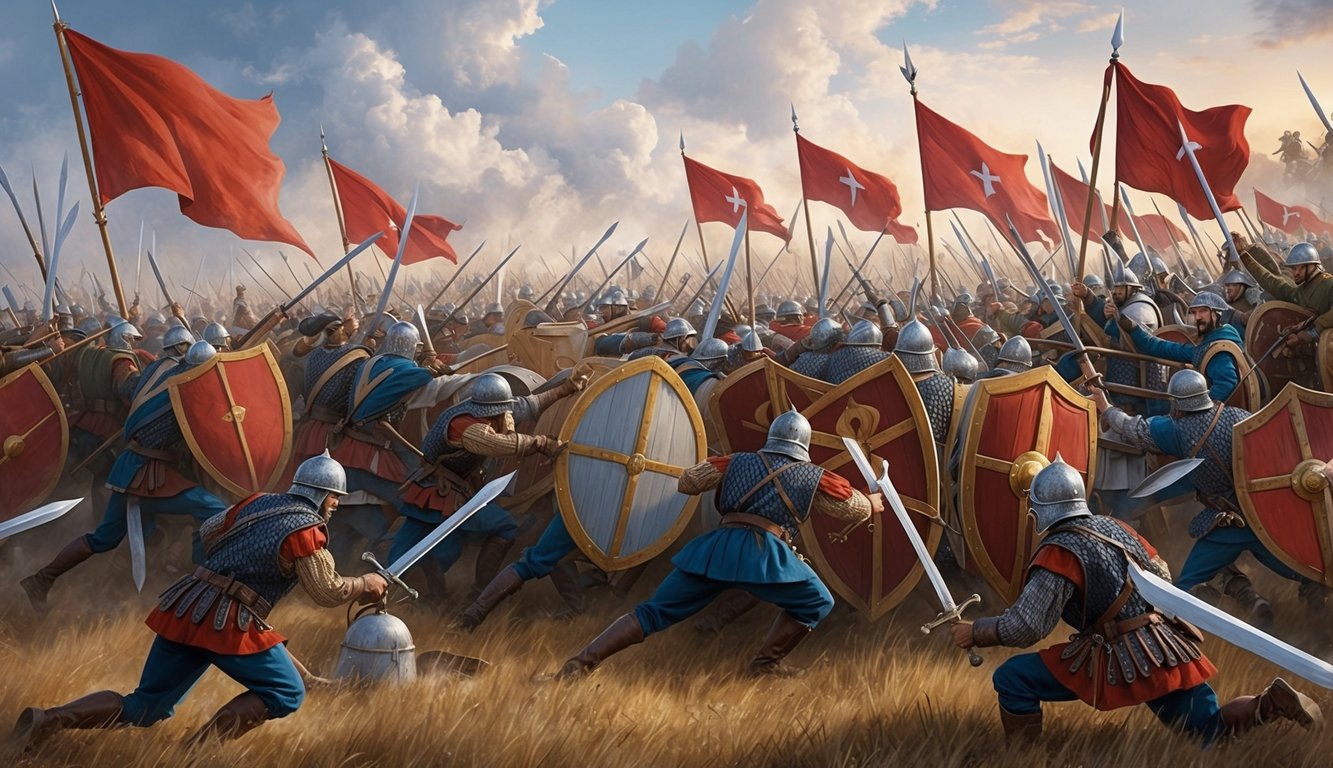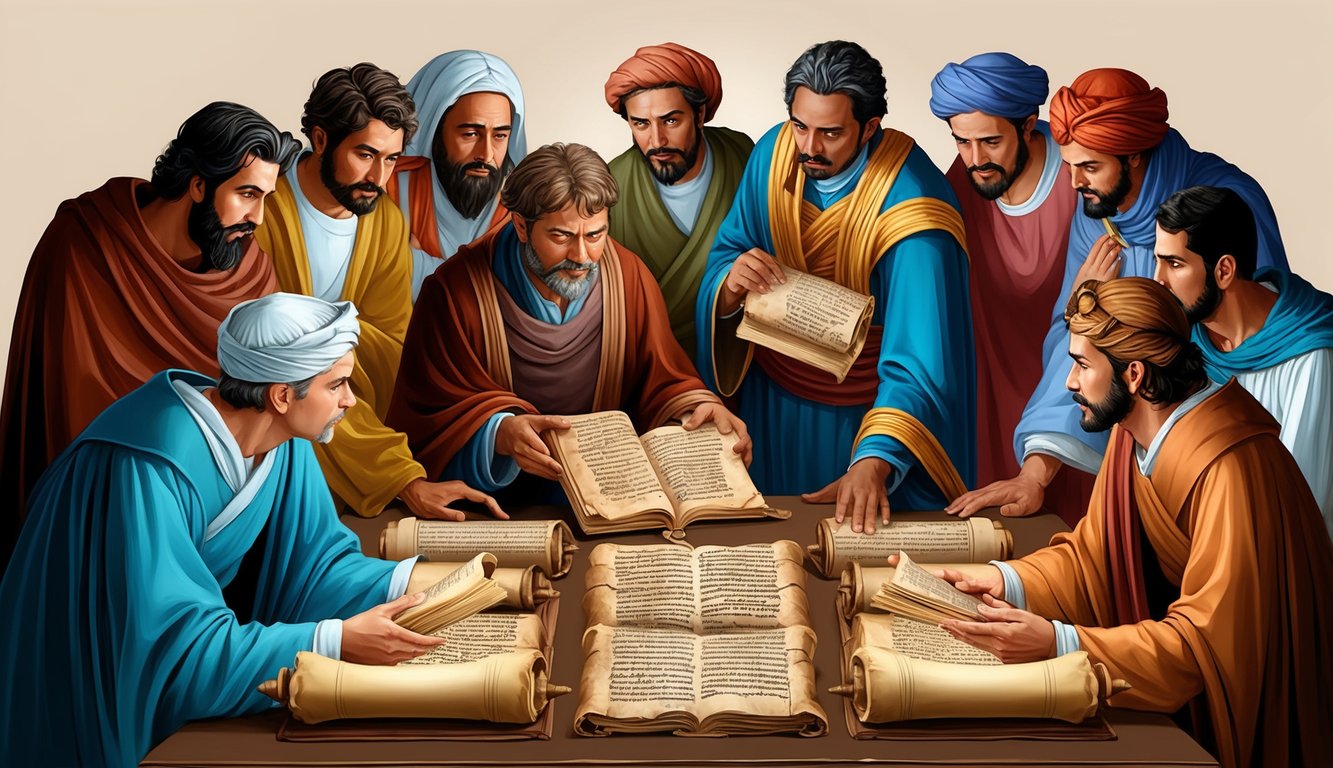Don’t Miss Out On This Unique Astrological Opportunity
Are you tired of spinning your wheels and getting nowhere? Simply put, you’re out of sync: you’re out of alignment with your astral configuration.
But: there’s a kind of map that can help you reclaim your alignment. Think of it as your own personal blueprint to success and happiness: a blueprint that will help you live your most amazing life.
Get started here.
King Jehoshaphat of Judah faced a dire situation in 2 Chronicles 20.
Three powerful armies advanced toward his kingdom, threatening to destroy everything in their path.
In a moment of great peril, Jehoshaphat turned to God, seeking divine intervention through fervent prayer.
This chapter of the Bible is a powerful testament to faith and reliance on a higher power during times of trouble.
At the heart of the story is a remarkable example of leadership and faith.
Jehoshaphat called on his people to trust in God, and they responded with song and praise.
The Lord’s guidance came through the prophet Jahaziel, who assured them that God would fight for them.
With unwavering trust, they marched into battle, armed not with weapons, but with their faith and music.
The outcome was extraordinary.
Without lifting a sword, the armies of Judah saw their enemies defeated.
This chapter is a timeless reminder of the strength found in faith and unity.
As you explore this story, consider the power of belief and the importance of turning to a higher source in times of despair.
Key Takeaways
- Jehoshaphat faced a great threat but turned to God for help.
- Victory was achieved through faith, music, and divine intervention.
- The story highlights the power of unity and belief.
The Threat Against Judah
The people of Judah faced a huge challenge when a large enemy army approached.
This overwhelming threat prompted action from King Jehoshaphat, who sought divine intervention through prayer and fasting.
The Approaching Armies
In ancient times, Judah was threatened by a powerful alliance.
The armies of the Moabites, Ammonites, and those from Mount Seir came together against Judah.
This coalition represented a force too great for Judah to handle on its own.
As news of the impending invasion spread, fear gripped the people.
The sheer size of the attacking army caused panic and uncertainty about their future.
This was not just a battle but a moment that could determine the fate of Judah itself.
Jehoshaphat’s Proclamation of a Fast
In response to this looming war, King Jehoshaphat demonstrated leadership.
He declared a fast throughout Judah, urging his people to seek help from God.
The fast was a collective cry for divine assistance, showing their reliance on heavenly guidance during this crisis.
Jehoshaphat gathered the people in Jerusalem to pray together.
This act of unity and faithfulness demonstrated their belief in God’s power to save them from judgment and destruction.
Seeking refuge in prayer and fasting was a way to face their fear with trust and hope.
Jehoshaphat’s Prayer and Jahaziel’s Prophecy
When faced with a looming threat, King Jehoshaphat called upon the Lord, demonstrating faith and seeking divine guidance.
In response, Jahaziel delivered a powerful message from God, assuring victory without battle.
Gathering at the Temple
King Jehoshaphat gathered the people of Judah at the Temple to seek God’s help.
This showed great leadership and unity as everyone came together in faith.
The crowd was filled with the fear of God, recognizing His power and might over the kingdoms and armies that threatened them.
Here, praise and worship set the tone, inviting the Holy Spirit’s presence to fill them with courage and hope.
Jehoshaphat’s Prayer for Deliverance
In this tense moment, Jehoshaphat bowed and prayed earnestly for deliverance.
He acknowledged God’s power, ruling over all nations, and expressed trust in God‘s ability to save.
Fasting accompanied the prayer, showing deep humility and reliance on God.
Jehoshaphat’s words were filled with reverence and faith, calling upon God to act in their time of need.
Jahaziel’s Message from God
Amid the assembly, the Spirit of the Lord spoke through Jahaziel, a Levite.
He assured them they would not need to fight this battle themselves.
God’s prophecy promised victory, instructing the people to have faith and stand firm.
Jahaziel’s words brought reassurance, emphasizing the might and presence of the Lord, who would save them without their army even lifting a sword.
The Battle and Victory

In 2 Chronicles 20, the story of Jehoshaphat’s battle unfolds with inspiring acts of faith and divine intervention.
The army of Judah faces a powerful enemy, yet their victory is marked by worship, praise, and unexpected ambushes set by the Lord.
Jehoshaphat’s Faith in the Prophecy
When an enormous army gathered against Judah, fear seemed unavoidable.
Yet, Jehoshaphat turned to prayer and called on God for help.
The prophet Jahaziel then delivered God’s message: “Do not be afraid or discouraged because of this vast army.
For the battle is not yours, but God’s.”
You see the King of Judah’s faith shine here.
He trusted in the prophecy that assured them of victory without needing to fight.
His belief in the Lord’s power and might shows that faith can conquer even the most daunting enemies.
Praising and Singing on the Battlefield
Jehoshaphat appointed a choir to lead the army in singing praises to the Lord. Imagine this: Instead of swords and shields leading the way, voices of worship went ahead.
They sang, “Give thanks to the Lord, for His love endures forever.”
This act of praise brought a divine presence into the battle scene.
You learn that worship is more than just music.
It is a powerful declaration of trust in God’s promise.
This display of faith set the tone for what was to come and showed the role of praise in securing victory.
The Lord Sets Ambushes
As the singing and praises filled the air, the Lord set ambushes against Judah’s enemies.
The attacking armies were thrown into confusion and began to fight among themselves.
Without raising a sword, the army of Judah witnessed the defeat of their foes.
This illustrates that God’s intervention can bring victory in unexpected ways.
The power and might of the Lord turned the tides in a miraculous fashion, leaving you with confidence that in life’s battles, divine help can transform fear into triumph.
Aftermath and Jehoshaphat’s Later Years

Following the victory over the enemy forces, Jehoshaphat and his people experienced prosperity and peace.
Jehoshaphat’s reign after the battle was marked by strategic alliances and other important events.
These shaped Judah’s future and his own legacy as king.
The Spoils of War and the Return to Jerusalem
After the miraculous victory, you would see Jehoshaphat leading his people to collect the spoils of war.
There were vast riches left behind by their fleeing enemies.
This wealth played a crucial role in boosting the economy of Judah.
When Jehoshaphat and the people returned to Jerusalem, they were filled with joy and gratitude.
They praised God for giving them victory without a traditional battle.
The plunder gathered was immense.
It strengthened their resources for future endeavors.
The return to Jerusalem was marked by great celebration and religious ceremonies.
It was a time when faith and community played central roles.
Jehoshaphat’s Reign After the Victory
In the years following the victory, Jehoshaphat continued to rule Judah with a focus on religious reform.
You could see his dedication to strengthening the worship of God and removing elements considered wicked from the land.
His reign was characterized by peace, largely because neighboring nations feared the power of Judah’s God.
During his rule, Jehoshaphat often sought divine judgment and counsel, which influenced his leadership.
He maintained traditions set by his father Asa, keeping the people aligned with their spiritual roots.
His rule brought stability and unity, fostering an era of prosperity that benefited all of Judah.
Alliances and End of Jehoshaphat’s Reign
In his later years, you might note Jehoshaphat’s alliances, notably with Ahaziah, king of Israel.
This alliance, especially in the venture to build trading ships, brought mixed outcomes.
The ships were destroyed, seen as divine disapproval of the partnership.
While his alliances showcased his strategic mind, some decisions were controversial.
These alliances brought temporary advantages but sometimes strayed from the spiritual principles he upheld.
Jehoshaphat’s reign ended on a note of stability and peace, allowing his legacy to be remembered as one of a king who prioritized faith and community welfare.
His later years highlighted the importance of balancing political and spiritual responsibilities.
Frequently Asked Questions

In 2 Chronicles 20, the power of faith, the importance of prayer, and the impact of divine prophecy are highlighted in Jehoshaphat’s battle story.
These elements show the significance of trust in God during challenging times.
What is the significance of the phrase ‘Do not be afraid or dismayed’ in 2 Chronicles 20:15?
This phrase brings comfort and reassurance.
When Jehoshaphat and the people of Judah faced a huge army, God’s message to them was not to fear.
It reminds you that even in the scariest moments, you are not alone.
How does 2 Chronicles 20 demonstrate the power of faith and obedience in the story of Jehoshaphat?
Faith and obedience are central in this chapter.
Jehoshaphat trusts God’s word delivered through a prophet, and they follow God’s instructions.
This story highlights that faith in God and following His guidance can lead to victory even against overwhelming odds.
Their unwavering commitment to remaining in God’s will demonstrates the power of trust and devotion.
As they move forward with praise and confidence, God fights the battle on their behalf, leading them to an unexpected triumph.
This account serves as a reminder that true victory comes not by human strength but by steadfast faith in God’s will and direction.
What does the prayer of Jehoshaphat in 2 Chronicles 20:12 teach us about reliance on God?
Jehoshaphat’s prayer shows his dependence on God for help.
He admits their weakness and asks for divine guidance.
This teaches you to seek God’s support when you face difficulties and recognize your limitations.
Can you explain the role of prophecy in the outcome of the battle in 2 Chronicles 20?
Prophecy plays a crucial role in guiding the people.
Through a prophet, God promises victory without a fight.
This prophecy reassures the people, showing the importance of listening to and trusting in God’s words.
What are the lessons to be learned from the divine intervention in the battle as described in 2 Chronicles 20?
Divine intervention demonstrates that God cares for His people and will provide help.
The miraculous victory achieved without fighting teaches you to have faith that God can handle challenges in unexpected ways.
In what ways does the chapter of 2 Chronicles 20 serve as an encouragement for personal faith?
This chapter is an example of how faith and prayer can provide strength.
Jehoshaphat’s trust in God during a crisis reminds you to rely on faith in difficult times.
It shows that belief and prayer can lead to divine assistance and peace.



